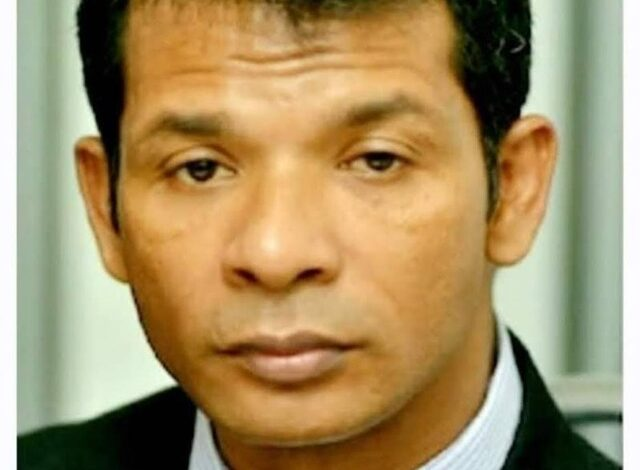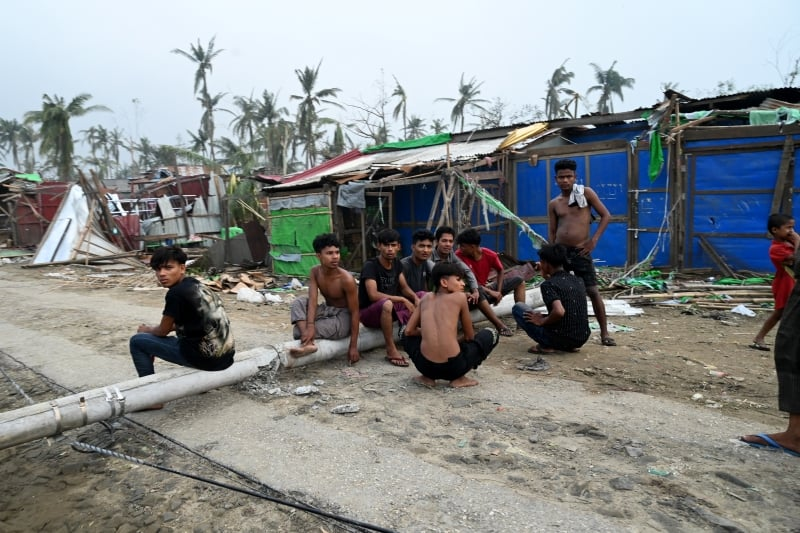Findings reveal “severe mental harm,” the “least-understood” act of genocide
sources by : https://www.fortifyrights.org/mya-inv-2024-04-24/
(DHAKA, April 24, 2024)— Severe Post-Traumatic Stress Disorder and depression among Myanmar’s Rohingya community constitute serious mental harm, defined by the Genocide Convention as an act of genocide, according to a new study released today by Fortify Rights and the Allard K. Lowenstein International Human Rights Clinic at Yale Law School. The study reveals how serious mental health conditions caused by Myanmar military-led attacks continue to destroy the Rohingya people in violation of the Genocide Convention. The study recommends ways to hold members of the Myanmar military and others criminally accountable for the Rohingya genocide and other mass atrocity crimes happening nationwide in Myanmar.
Fortify Rights and the Lowenstein Clinic recommend that state parties to the Rome Statute, which established the International Criminal Court (ICC), immediately refer the situation in Myanmar to the ICC Prosecutor, requesting a full investigation into atrocities committed in Myanmar since 2002.
“Mental harm is an act of genocide under the law and is often overlooked. The Rohingya genocide is ongoing, and this study explains how mental harm continues to be a part of it. This study is meant to inform humanitarian interventions and future prosecutions in The Hague and elsewhere,” said Matthew Smith, chief executive officer of Fortify Rights. “How long will the people of Myanmar have to wait for justice? The situation is deadly and urgent, and state parties to the ICC should act without delay.”

Although most people associate genocide with mass killing, the 1948 Genocide Convention lists four prohibited acts in addition to killing. They include “causing serious bodily or mental harm.” Over the years, international tribunals prosecuting genocide have focused primarily on serious bodily harm and have struggled to find serious mental harm as an independent act of genocide—that is, without tying it closely to acts that caused serious bodily harm.
The 88-page study, “My Tears Could Make a Sea”: Mental Harm as Genocide Against Rohingya, addresses how inflicting mental harm can destroy a group of people in whole or in part, focusing specifically on the Rohingya genocide. The study provides prosecutors, scholars, human rights groups, and humanitarian aid organizations with a better understanding of serious mental harm as an act of genocide and an analysis of the ongoing destructive effects of mental harm on the Rohingya people.
“The Lowenstein Clinic team analyzed an enormous amount of information about the atrocities the military and others carried out against Rohingya in Rakhine State and about the severe mental-health damage Rohingya living in camps in Bangladesh have suffered,” said Yale Law School Clinical Professor Jim Silk, who supervised a team of three former Lowenstein Clinic members who were primary authors of the report. “We carefully applied the law of genocide to this well-documented record of cruelty and persistent mental harm.”
Unlike killing or inflicting physical wounds, mental harm is not always readily identifiable. Furthermore, the study found that it can have lasting effects and even be transferred inter-generationally. Judicial decisions and scholarly interpretation have established that a finding of “serious mental harm” under the law of genocide requires more than a minor or temporary impairment of mental faculties. Serious mental harm is not always “permanent or irremediable” but does result in “grave and long-term disadvantages to a person’s ability to lead a normal and constructive life.”
“My Tears Could Make a Sea” is based on quantitative, mental-health-related data collected by Fortify Rights and a team of Rohingya researchers from 2018 to 2020 in Rohingya refugee camps in Bangladesh. It also draws on hundreds of pages of eyewitness and survivor testimony collected by Fortify Rights following Myanmar military-led attacks against Rohingya women, men, and children in Rakhine State, Myanmar in 2016 and 2017. The Lowenstein Clinic at Yale Law School analyzed this data through the lens of the law of genocide and using the tools of social science, especially psychology.

– Rohingya woman and refugee, age 45, from Rathedaung Township. ©Saiful Huq Omi, Counter Foto, Bangladesh, 2023
Medical science has come a long way since the drafting of the Genocide Convention, when little was known about conditions like Post Traumatic Stress Disorder (PTSD), depression, and emotional distress. “My Tears Could Make a Sea” finds that, when perpetrated against a defined group and with the necessary intent, those committing acts that inflict these conditions meet the definition of “causing serious…mental harm” as an act of genocide.
Recent research into Adverse Childhood Experiences and intergenerational trauma suggests that disruptions to everyday life caused by PTSD, depression, and emotional distress can persist throughout a lifetime and even be passed down to younger generations. The long-lasting mental harm perpetrated against a defined group can contribute to the destruction of that group and, thus, provide further evidence that the acts causing this harm constitute genocide.
The quantitative data on which this new study is based show that the trauma the Myanmar authorities inflicted upon the Rohingya people resulted in extremely high levels of PTSD, depression, and anxiety. The study found that all these conditions disrupted Rohingya individuals’ ability to lead normal and constructive lives, causing long-term health issues and serious difficulties in daily functioning.
“There are plenty of examples of Rohingya resilience and growth in recent years, despite extreme violence and hardships in Myanmar and the camps in Bangladesh,” said Zaw Win, Human Rights Specialist at Fortify Rights. “Rohingya people know firsthand how the Myanmar military has sought to destroy them in many ways and for many years, including through serious mental harm. The international community can do more to ensure those responsible are held accountable and survivors have access to necessary health care.”
Nearly all the Rohingya refugees surveyed in Bangladesh by Fortify Rights reported that they had survived horrific experiences in Myanmar – 98.6% were exposed to frequent gunfire, 97.8% witnessed the burning and destruction of villages, 91.8% witnessed dead bodies, and 90.4% witnessed physical violence against others. These types of traumatic events are known to cause long-term mental health conditions such as PTSD, depression, and anxiety.
“The situation is difficult to describe,” a Rohingya woman told Fortify Rights, explaining what she witnessed in northern Rakhine State during military-led attacks in 2016. “They cut the women’s breasts. I saw so many killed.”
The World Health Organization estimates that in normal circumstances, 10% of any adult population is affected by some moderate or mild mental health disorder. Twelve months after a humanitarian emergency, the rate of adults experiencing these types of mental health disorders, including depression and PTSD, is expected to increase to 15-20% of the population. The rates among the Rohingya refugee population in Bangladesh are dramatically higher. Some 61.2% of Rohingya in the camps in Bangladesh report symptoms consistent with PTSD, 88.7% report depression, and 84% report emotional distress, including symptoms of anxiety combined with depression.
While human rights defenders, academics, and others tend to view mental harm as the result of atrocity crimes rather than a criminal act itself, “My Tears Could Make a Sea” explains how the infliction of serious mental harm can be a stand-alone act of genocide. The language of Article II (b) of the Genocide Convention defines “causing serious bodily ormental harm to members of the group” (italics added) as one of the four categories of acts that can constitute genocide; however, the Convention does not require a finding of bodily harm to determine that a group suffered the genocidal act of inflicting mental harm.
The data collected by Fortify Rights and a team of Rohingya researchers on the mental condition of Rohingya genocide survivors indicate that their high levels of PTSD, depression, and emotional distress resulted from the trauma the Myanmar authorities and their forces and allies inflicted upon them. Studies demonstrate that these debilitating conditions often persist for decades after the traumatic experience and disrupt the ability of survivors to lead normal and constructive lives.

The Rohingya of Myanmar have suffered persecution and attacks for decades. In 2016 and 2017, the Myanmar military led attacks against Rohingya in Rakhine State, committing massacres and forcing the displacement of more than 700,000 to Bangladesh. The violence and terror were widely viewed as genocide. Fortify Rights, a U.N. Fact-Finding Mission, and the Government of the United States of America each determined that the Myanmar military is responsible for genocide against the Rohingya. The Lowenstein Clinic and Fortify Rights first reported on the Rohingya genocide in a joint report in 2015.
Several accountability mechanisms have been initiated to address mass atrocity crimes in Myanmar. In September 2018, the U.N. Human Rights Council passed a resolution establishing the Independent Investigative Mechanism for Myanmar to prepare case files, support criminal proceedings, and ensure accountability for those responsible for mass atrocity crimes committed in Myanmar since 2011. In November 2019, the Government of The Gambia brought a case against Myanmar at the International Court of Justice for genocide against Rohingya; the case is ongoing. Since 2019, the Office of the Prosecutor at the ICC has been investigating the forced deportation of Rohingya from Myanmar to Bangladesh as a crime against humanity, although the Court has not issued arrest warrants. Lastly, at the time of writing, an Argentinian prosecutor is investigating allegations of genocide against Rohingya in Myanmar, and as of June 2023, a few Rohingya testified at a Buenos Aires court in relation to the investigation; the Burmese Rohingya Organization U.K. and others brought this case under the principle of universal jurisdiction, and as of December 2023, sought arrest warrants against seven individuals including senior military officials.
“State parties to the ICC should immediately refer the situation in Myanmar to the ICC Prosecutor under Article 14 of the Rome Statute,” said Matthew Smith. “The evidence of the military’s crimes against the people of Myanmar is overwhelming, and to this day, no one from the military has been held accountable for the Rohingya genocide or atrocity crimes against other ethnic groups in the country, especially since the coup in 2021.”
“My Tears Could Make a Sea” includes more than 35 recommendations to relevant parties, including the Myanmar military junta, the National Unity Government of Myanmar, U.N. member states, and humanitarian organizations providing aid to Rohingya genocide survivors.
Fortify Rights and the Lowenstein Clinic recommend that the ICC issue arrest warrants as soon as possible for those responsible for atrocities related to the ICC’s ongoing investigation into forced deportation. The two organizations also recommend that donor governments fund humanitarian agencies to expand their psychosocial support services to Rohingya survivors and to conduct a longitudinal study on the ongoing mental health effects of the Rohingya genocide. The study would inform humanitarian interventions and future prosecutions.
In addition to identifying and analyzing the mental harm that is specific to the Rohingya genocide, Fortify Rights and the Lowenstein Clinic noted the Myanmar military junta’s ongoing attacks against civilians and non-military targets throughout the country, including on schools and places of religious or cultural significance—attacks that affect all ethnic and religious groups in Myanmar.
“The military junta is inflicting suffering on all the people of Myanmar and carrying out nationwide attacks against them,” said Professor Jim Silk. “U.N. member states should adopt the recommendations of the U.N. Special Rapporteur on the Situation of Human Rights in Myanmar and take immediate, coordinated action to deprive the junta of access to weapons, revenue, and political legitimacy and support efforts to hold perpetrators of atrocity crimes in Myanmar accountable.”





